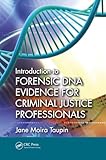Introduction to Forensic DNA Evidence for Criminal Justice Professionals Jane Moira Taupin
Material type: TextLanguage: Eng. Publication details: CRC Press Taylor & Francis Group 2014 Boca RatonEdition: Description: 174p. 15.24 x 1.12 x 22.86 cmISBN:
TextLanguage: Eng. Publication details: CRC Press Taylor & Francis Group 2014 Boca RatonEdition: Description: 174p. 15.24 x 1.12 x 22.86 cmISBN: - 9781439899090
- 614.1 TAU
| Item type | Current library | Call number | Materials specified | Status | Date due | Barcode | |
|---|---|---|---|---|---|---|---|
 Books
Books
|
Rashtriya Raksha University | 614.1 TAU (Browse shelf(Opens below)) | Available | 9379 |
The use of DNA profiling in forensic cases has been considered the most innovative technique in forensic science since fingerprinting, yet for those with limited scientific knowledge, understanding DNA enough to utilize it properly can be a daunting task. Introduction to Forensic DNA Evidence for Criminal Justice Professionals is designed for nonscientific readers who need to learn how to effectively use forensic DNA in criminal cases.Written by a forensic scientist world renowned for her expertise in clothing examination, the book provides a balanced perspective on the weight of DNA evidence. Going beyond a simple explanation of the methodology, it arms attorneys and other criminal justice professionals with knowledge of the strengths and limitations of the evidence, including the danger in relying on DNA statistical probabilities in the determination of guilt. The book covers the most common DNA methods used in criminal trials today―nuclear DNA short tandem repeat (STR) techniques, mitochondrial DNA, and Y-STR profiling. It helps prosecutors know when to emphasize DNA evidence or proceed with trial in the absence of such evidence. It assists defense lawyers in knowing when to challenge DNA evidence and perhaps employ an independent expert, when to focus elsewhere, or when to secure the advantage of an early guilty plea.By imparting practical and theoretical knowledge in an accessible manner, the book demystifies the topic to help both sides of the adversarial system understand where DNA evidence fits within the context of the case.
There are no comments on this title.

